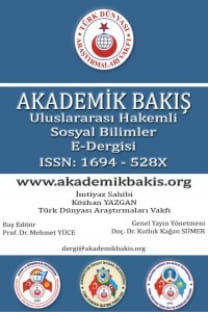DÜŞÜNCE ÖZGÜRLÜĞÜNE VERİLEN ÖNEM AÇISINDAN HUKUK SİSTEMLERİNE KAVRAMSAL BİR YAKLAŞIM
Düşünce, Düşünce Özgürlüğü, Uluslararası Belgeler, Hukuk, İslam Hukuku
A CONCEPTUAL APPROACH ON LAW SYSTEMS IN TERM OF IMPORTANCE TOWARDS TO FREEDOM OF THOUGHT
Key Words: Thought, Freedom of thought, International Documents, Law, Islamic Law.,
- Başlangıç: 2004
- Yayıncı: Akademik Bakış
GELİŞMİŞ ÜLKELERDE GENİŞLETİCİ, GELİŞENLERDE İSE SIKI PARA POLİTİKASI VE KÜRESELLEŞME
MEVLANA MESNEVİSİNDE AŞKIN BİLİNÇ
KISA KARARLILIK ÖLÇEĞİNİN TÜRKÇE FORMUNUN (KKÖ) : GEÇERLİK ve GÜVENİRLİK ÇALIŞMASI
GERÇEKLEŞEN BİR KÖTÜLÜK: NEKROFİLİ: ÜST SINIFLARDAKİ YIKICILIK EĞİLİMİ ve TOPLULUK NARSİSİZMİ
KIRIMIN RUSYA FEDERASYONUNA BAĞLANMASININ RUSYAYA KOMŞU ÜLKELERE OLASI ETKİLERİ
Abdulkadir BAHARÇİÇEK, Osman AĞIR
AZERBAYCAN'A KARŞI YÜRÜTÜLEN BİLGİ MANİPULYASYONUNUN VE SAVAŞININ BAŞLICA PARAMETRELERİ
DÜŞÜNCE ÖZGÜRLÜĞÜNE VERİLEN ÖNEM AÇISINDAN HUKUK SİSTEMLERİNE KAVRAMSAL BİR YAKLAŞIM
ETNOGRAFİK MALZEMENİN SANATSAL KULLANIMI: ALANDAN SAHNEYE BALIKESİR KÖY HAVASI" OYUNU ÖRNEĞİ
İŞGÖRENLERİN ÇEŞİTLİLİK VE ÇEŞİTLİLİKLERİN YÖNETİMİALGISINA İLİŞKİN KARŞILAŞTIRMALI BİR ARAŞTIRMA
